Completed evaluations
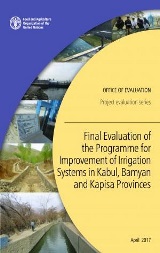
Final Evaluation of the Programme for Improvement of Irrigation Systems in Kabul, Bamyan and Kapisa Provinces
30/04/2017
The main purpose of the evaluation was to provide accountability to the donor and partners by assessing FAO’s contribution to the overall objective of the programme i.e. improved, reliable and equitable distribution of irrigation water to increase agricultural production and productivity for improved food security. The final evaluation assessed achievements of the projects at district- and farm-levels derived from project reporting, surveys, interviews and GIS maps and photographs.
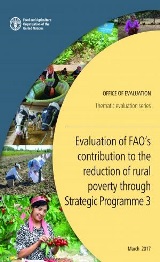
Evaluation of FAO’s contribution to rural poverty reduction through Strategic Programme 3
13/04/2017
This report outlines the main findings and conclusions from an evaluation of FAO’s contribution to reducing rural poverty (SO3) through the Strategic Programme 3 (SP3). SO3 is one of the five Strategic Objectives approved at the 38th FAO Conference session (June 2013), as part of the Revised Strategic Framework 2010-19.
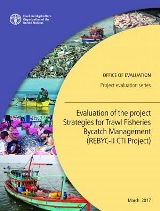
Evaluation of the project on Strategies for Trawl Fisheries Bycatch Management
12/04/2017
This report provides a final evaluation of the project Strategies for Trawl Fisheries Bycatch Management which started in November 2011. The project supported activities in five participating countries – the Republic of Indonesia, the Independent State of Papua New Guinea, the Republic of Philippines, the Kingdom of Thailand and the Socialist Republic of Viet Nam – as well as at the regional level.
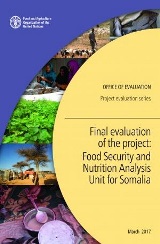
Final evaluation of the project: Food Security and Nutrition Analysis Unit for Somalia
31/03/2017
The Food Security and Nutrition Analysis Unit (FSNAU) project was established in 1994. This report presents the final evaluation of the project, covering the period from 2013 to 2016. The purpose of the evaluation was to inform the Project Working Group (PWG), the Project Task Force (PTF), donors and other stakeholders about the project’s achievements towards attaining the expected results, and the sustainability of these results.
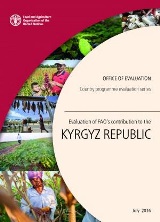
Evaluation of FAO’s contribution in the Kyrgyz Republic
09/01/2017
This evaluation assessed FAO’s contribution in the Kyrgyz Republic through each of the priority areas of work under the Country Programming Framework 2015–2017: food security and nutrition, sustainable management of natural resources, climate change and rural poverty reduction.
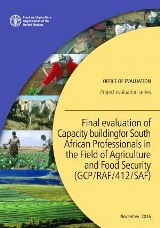
Final evaluation of Capacity building for South African Professionals in the Field of Agriculture and Food Security (GCP/RAF/412/SAF)
30/11/2016
The purpose of this evaluation was to analyse FAO’s assistance to the Government of South Africa and the Department of Agriculture, Forestry and Fisheries (DAFF). The evaluation highlights the results of each of the project components, as well as the causes for successes and failures, over the entire period of project implementation (2007-2016).
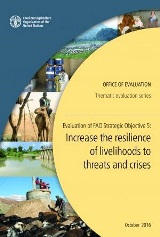
Evaluation of FAO Strategic Objective 5: Increase the Resilience of Livelihoods to Threats and Crises
03/11/2016
In the FAO’s Reviewed Strategic Framework 2010-19, Strategic Objective 5 (SO5) was dedicated to “increase the resilience of livelihoods to threats and crises”. This evaluation reviewed the conceptual and planning framework for SO5, FAO’s capacity to translate the framework into action, preliminary results achieved, and FAO’s global positioning in resilience....
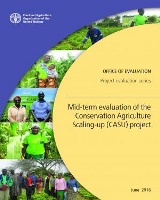
Mid-term evaluation of the Conservation Agriculture Scaling-up project in Zambia
02/11/2016
This evaluation reviewed the Theory of Change, logframe, progress of the project and identified design and implementation issues to be addressed to strengthen implementation. It found that the project is making good progress towards its objectives. Nutrition and food security are improving for participating farmers as their production and income...
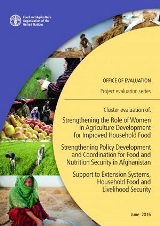
Evaluation of projects on Community Empowerment and Institutional Strengthening for Improved Food and Nutrition Security in Afghanistan
01/11/2016
This cluster evaluation assessed the overall contribution of three interlinked projects related to food security and nutrition in Afghanistan. It found that the food security cluster has contributed to women’s empowerment through the formation of common interest groups for women, increased knowledge and skills in mushroom farming, and improved technology...
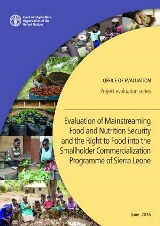
Evaluation of the project on Mainstreaming Food and Nutrition Security and the Right to Food into the Smallholder Commercialization Programme of Sierra Leone
01/11/2016
This evaluation assessed progress in supporting the Government of Sierra Leone and its partners to promote the Right to Food and improve dietary quality through a smallholder commercialisation programme and district development plans.
